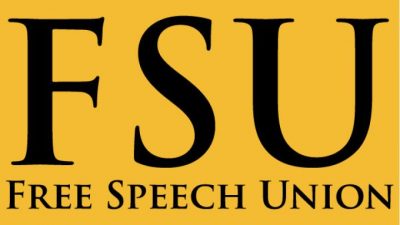Coronavirus and Freedom of Expression. “The Right to Tell People Things They Do Not Want to Hear.”
The Free Speech Union Fighting Fund

Free speech is the bedrock on which all our other freedoms rest, yet it is currently in greater peril than at any time since the Second World War. The Free Speech Union is a non-partisan, not-for-profit membership organisation that stands up for people whose right to freedom of expression has been violated.
Not only do we pressure institutions to uphold their own free speech policies through direct challenges and media pressure, but we also litigate when we believe they’ve behaved unlawfully. This work is particularly urgent in the present climate, with people being cancelled every day for daring to challenge the latest ideological dogma.
Freedom of expression is legally protected in Britain, but that’s often forgotten by private companies and public organisations when they come under pressure to get rid of someone who’s said something people don’t want to hear. Faced with an angry mob on social media, the people at the top nearly always cave in, firing the heretic in question or forcing them to resign. Due process is forgotten and people’s careers and reputations are destroyed.
One of the best ways to protect people from mob justice is to let their bosses and the powers that be know that there is an organisation out there that will stand up for people’s speech rights in the courts. That’s where the FSU litigation fund comes in.
When, on 20th April 2020, the broadcast regulator slapped down Eamonn Holmes, an ITV presenter, for arguing in favour of always maintaining an open mind with respect to different theories about the coronavirus crisis and the Government’s response to it, the FSU decided it needed to do something to defend the right of Holmes and other broadcasters to express their views freely without fear of being censured by Ofcom. Given that it is likely that Ofcom will become the regulator of the internet as well in due course, we consider it vitally important that it should pay proper attention to Article 10 of the European Convention on Human Rights which protects the right to freedom of expression. Ofcom should encourage – rather than discourage – open debate.
We lodged a complaint with Ofcom in the hope that it would realise the error of its ways. However, it refused to budge on the issue, citing the ‘coronavirus guidance’ it had published on March 23rd, the same day the country was placed under a full lockdown, which cautioned broadcasters to exercise extreme caution when airing the views of people who were critical of the official response to the pandemic. Consequently, we decided to apply for permission to Judicially Review that guidance in the High Court. We hope to be able to persuade the Court that the guidance is unlawful.
When we raised a similar issue with the Isle of Man’s Communications Commission, the IoM equivalent of Ofcom, its response was very different. They were, at the time, investigating a complaint about a chat show host, Stuart Peters, and we were concerned that they would neglect Mr Peters’ Article 10 rights. Mr Peters had challenged the concept of white privilege in the course of a robust exchange of views with a caller to his radio station and we did not think he should be penalised for that.
In the event, the Communications Commission took proper account of the importance of Mr Peters’ right to free speech, finding in his favour and stating in their report that: “The Commission is of the view that open and honest debate about such issues is required as part of the democratic process and encourages this to take place.”
As the FSU has a range of obligations towards its members, it has opened this separate litigation fund so that those who specifically support this and other general litigation can do so, whether or not they wish to join the FSU.
A judge will shortly decide whether to allow us to proceed with a Judicial Review of Ofcom’s guidance. We think we have a strong case, but in the event of losing Ofcom will ask us to pay its costs so we have asked the judge for a ‘Protective Costs Order’ which places a cap on the liability faced by the FSU. We have said that we want the cap to be whatever is in this fund when the case has been decided. If the High Court finds in our favour, the money in this fund will be held over and used to support other litigation to protect free speech.
As George Orwell said, “If liberty means anything at all, it means the right to tell people things they do not want to hear.”
It’s more important now than ever to stand up for that right.
Organization’s Note: The organiser of this campaign is the FSU’s Company Secretary. All funds raised will go to The Free Speech Union Limited.
*
Note to readers: please click the share buttons above or below. Forward this article to your email lists. Crosspost on your blog site, internet forums. etc.
Featured image is from TFSU

